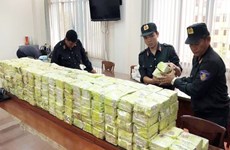Minister vows to stabilise prices of essential goods
Price hikes, public debt and the operations of State-owned groups and
enterprises were major issues that Finance Minister Vu Van Ninh focused
on at a National Assembly hearing on Nov. 23.
Price hikes, public debt and the operations of State-owned groups and
enterprises were major issues that Finance Minister Vu Van Ninh focused
on at a National Assembly hearing on Nov. 23.
While explaining the consumer price index (CPI) rise of 7.58 percent in the first ten months of this year compared with December 2009, Ninh said major reasons are the growing domestic demands for foods and materials, while local producers failed to meet these needs and production costs are not competitive.
The strong fluctuation in prices of gold and foreign currencies on the global market has also pushed up the CPI, the minister said.
However, Ninh noted that prices of several essential goods such as coal, electricity and petroleum remain lower than those in regional countries and will be adjusted in line with the market roadmap.
“In the future, the Ministry of Finance will adopt measures to control prices, especially those of prioritized commodities such as medicines, milks, steel, construction materials and gas,” he stressed.
Regarding public debt, Ninh said Vietnam is now free of overdue debt, adding that public and government debts in the next decade were still within the approved level, ensuring national financial security and that due foreign debts have been fully paid.
He cited the fact that government debts accounted for 41.9 percent of the country’s gross domestic product (GDP) and foreign debts were equivalent to 38.8 percent of the GDP in 2009, lower than the safety level of 50 percent of GDP approved by the Prime Minister in November, 2004.
The minister, nevertheless, warned that this issue must be considered carefully in the long term, noting that the government is drafting a debt strategy through 2020-2030 in order to guarantee national financial security.
On measures to prevent the recurrence of gold and US dollar “fevers”, Ninh said Vietnam is suffering a trade deficit that makes people buy gold and US dollar for reserves, worsening the supply-demand balance and badly affecting prices of other commodities.
The government has already taken intervention steps, including adjusting the prime interest rate, providing more US dollars for the market to balance supply and demand, and permitting the import of gold. The State Bank of Vietnam is mapping out a project to stabilise the gold market in the long run.
Asked about the management of capital and operations of State-owned groups and enterprises, Ninh said his ministry is working on a project to re-evaluate the value of these firms.
According to the minister, equitisation is the best way to create a breakthrough for State-owned groups and enterprises, but the move should be conducted cautiously.
He said the government has instructed concerned ministries to examine businesses and sectors in which the government is holding ownership and assigned the execution of equitization to ministries, localities and businesses in an effort to speed up this process./.
While explaining the consumer price index (CPI) rise of 7.58 percent in the first ten months of this year compared with December 2009, Ninh said major reasons are the growing domestic demands for foods and materials, while local producers failed to meet these needs and production costs are not competitive.
The strong fluctuation in prices of gold and foreign currencies on the global market has also pushed up the CPI, the minister said.
However, Ninh noted that prices of several essential goods such as coal, electricity and petroleum remain lower than those in regional countries and will be adjusted in line with the market roadmap.
“In the future, the Ministry of Finance will adopt measures to control prices, especially those of prioritized commodities such as medicines, milks, steel, construction materials and gas,” he stressed.
Regarding public debt, Ninh said Vietnam is now free of overdue debt, adding that public and government debts in the next decade were still within the approved level, ensuring national financial security and that due foreign debts have been fully paid.
He cited the fact that government debts accounted for 41.9 percent of the country’s gross domestic product (GDP) and foreign debts were equivalent to 38.8 percent of the GDP in 2009, lower than the safety level of 50 percent of GDP approved by the Prime Minister in November, 2004.
The minister, nevertheless, warned that this issue must be considered carefully in the long term, noting that the government is drafting a debt strategy through 2020-2030 in order to guarantee national financial security.
On measures to prevent the recurrence of gold and US dollar “fevers”, Ninh said Vietnam is suffering a trade deficit that makes people buy gold and US dollar for reserves, worsening the supply-demand balance and badly affecting prices of other commodities.
The government has already taken intervention steps, including adjusting the prime interest rate, providing more US dollars for the market to balance supply and demand, and permitting the import of gold. The State Bank of Vietnam is mapping out a project to stabilise the gold market in the long run.
Asked about the management of capital and operations of State-owned groups and enterprises, Ninh said his ministry is working on a project to re-evaluate the value of these firms.
According to the minister, equitisation is the best way to create a breakthrough for State-owned groups and enterprises, but the move should be conducted cautiously.
He said the government has instructed concerned ministries to examine businesses and sectors in which the government is holding ownership and assigned the execution of equitization to ministries, localities and businesses in an effort to speed up this process./.













